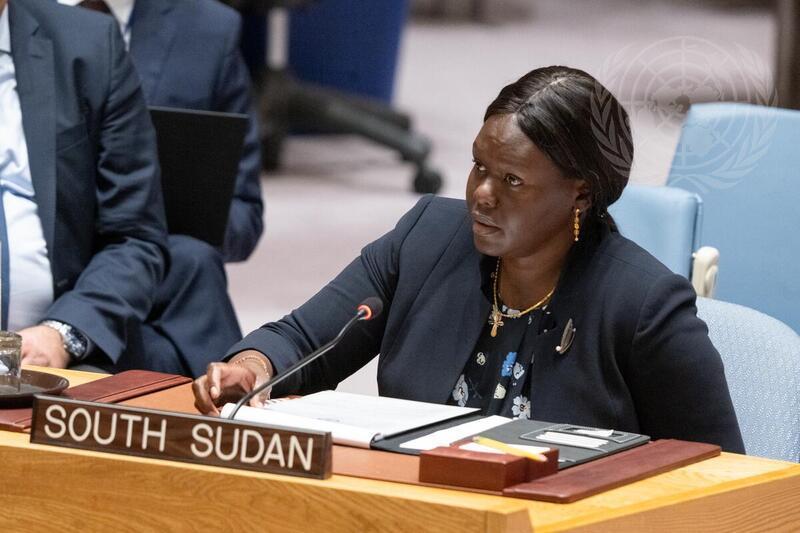Africa-Press – South-Sudan. South Sudan’s Permanent Representative to the United Nations, Ambassador Cecilia Adut Manyok has voiced strong disappointment over the UN Security Council’s recent decision to renew the arms embargo and targeted sanctions on individuals in South Sudan, describing the move as a setback to the country’s fragile peace process and efforts to unify the armed forces.
The UN Security Council on May 30, 2025, voted to extend the arms embargo and sanctions until May 31, 2026, citing concerns over continued political instability and the risk of renewed conflict.
The resolution, however, was met with sharp opposition from Russia and China, both of which criticised the approach as overly punitive and counterproductive.
Speaking at the UN headquarters in New York, May 30, Ambassador Adut stressed that the ongoing sanctions were obstructing the training and deployment of the Necessary Unified Forces — a key pillar of the 2018 Revitalized Peace Agreement.
She emphasized that progress on unifying the army and preparing for national elections in 2026 is already underway, but the sanctions remain a major hurdle.
“Our proposal aimed to reinforce the role of the unified forces under Chapter Two of the agreement, which is central to the peace architecture we are working tirelessly to implement,” Ambassador Adut said.
She noted that while South Sudan welcomes certain elements of the resolution, such as continued international attention to the peace process, the failure to lift or ease the arms embargo ignores the realities on the ground and disregards progress made in constitutional development, population census, and other foundational reforms.
South Sudan also expressed gratitude to member states and regional bodies that supported a more flexible and sovereignty-respecting approach.
Countries such as China, Russia, Pakistan, Algeria, Sierra Leone, Somalia, and institutions like the African Union and IGAD were recognized for their solidarity and advocacy for nationally driven solutions.
“Your commitment to fairness and recognition of homegrown solutions have not gone unnoticed,” Adut said, directing appreciation to these nations for their consistent engagement during negotiations.
Beyond the security implications, the ambassador warned that the sanctions are having broader economic consequences — deterring foreign investors, limiting access to international credit, and suffocating small business growth.
She shared a message from a South Sudanese entrepreneur who lamented that the ongoing restrictions scare off potential investors.
“We are not asking for a blank check,” she said. “We are asking for a fair opportunity and a balanced approach that supports those working for peace and economic renewal.”
Six countries reportedly abstained from the vote, expressing regret that the resolution did not go far enough in addressing the challenges facing the unification of forces and broader security sector reform.
Despite the setback, Ambassador Adut reaffirmed South Sudan’s commitment to the peace process, constitutional reform, and preparations for democratic elections.
She underscored the country’s emphasis on national ownership and locally driven development efforts.
The arms embargo was initially imposed in July 2018 through Resolution 2428 in response to the civil conflict, widespread human rights violations, and breaches of ceasefire agreements.
Since then, the government argues, South Sudan has made significant steps forward and deserves greater international support, not further isolation.
For More News And Analysis About South-Sudan Follow Africa-Press






